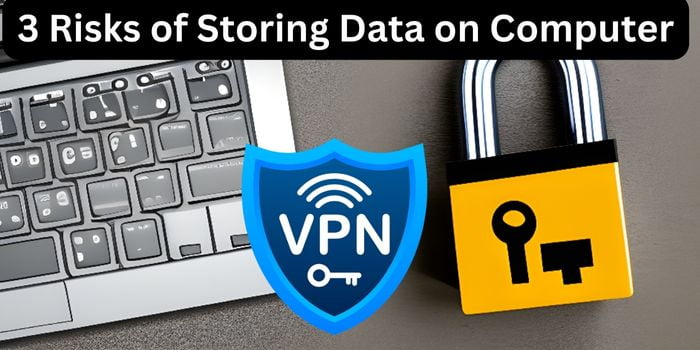Keeping data on your computer is not secure, as there is a possibility of information leaks. Every time you post stuff online or store data offline, security should be on your mind. When you save data on a local drive, there is more risk of unauthorized access.
Today, the internet and connected devices have made our lives easier, but these innovations have also increased online vulnerabilities. However, encryption and password protection can protect your data from hacking attempts and loss.
If you feel that keeping data on the hard drive is the best option, here’s what you should know about the risks of offline data storage.
Why Saving Data Locally is Not Recommended
We’ve all faced it once. Files cluttering your laptop and hundreds of folders making your digital workspace a mess is a common problem. While keeping your computer organized is a challenge, saving sensitive data on a system without having security protocols in place poses a number of risks.
Slow Performance
Storing all your files on the computer not only post-security threats to data but there are also other risks involved. Keeping everything on the desktop makes your system mess up and you will have to spend longer than usual if the files are not organized regularly.
Your laptop can produce excessive heat as the programs will start to function slower than usual. Moreover, a lack of storage on the local drive may lead to other performance issues such as freezing apps, sluggish tasks, and more.
In the digital-oriented era, we have an app for everything. So, the way your computer performs matters more than ever as there are a dozen apps that create a family tree and are highly useful if there are multiple users using the same device.

Data Loss
Suppose the laptop where you stored all your important data crashed all of a sudden. As a result, you lost all the data in an instant. Sometimes, the data loss is beyond repair and it’s hard to recover it even with the help of a data recovery tool.
Other than hardware failure, there are other reasons that lead to loss of data. If your laptop is stolen or you lost it somewhere, how would you be able to access your data? Moreover, liquid spills or sudden power outages can harm your computer and may end up losing data.
When your data is stored locally, there are more chances of losing files due to accidental deletion or unintentional removal. While erasing a particular file, you might have deleted all associated files stored inside the folder leading to data loss.
Unauthorized Access
Your computer or local network storage may be password protected and have other security parameters in place. But someone with the right to access data or the hard drive can view the data and use it to its own advantage.
If any of your business information is leaked, your organization’s reputation could be put at stake. So, you can rely on word of mouth when it comes to the security of data. However, make sure to password-protect all your files for preventing such incidents.
Even if the files are password-protected, the probabilities of illegal access always exist. More often, users forgot the passwords that they have assigned to a file or a folder, losing it forever. In this case, password unlocker apps can help regain access to data.
Where You Should Keep Your Data? A Potential Solution
So far, you should have understood the risks of storing data in local media and why you should ignore them. But, what’s the alternate solution to storing data securely without compromising security?
The answer is Cloud. Storing data in the cloud eliminates the risks of losing access to data. Yes, data loss is no more a concern as what you store on Cloud remains there on Cloud.
With the high accessibility and availability offered by Cloud providers, you can view your data anytime.
Moreover, access to the data stored online is not device-specific as in the case of local storage. Once you move data to the Cloud, view it from anywhere using any device. Even if you have moved files from your computer, you can view them on your smartphone.
Since the data stored on the Cloud is end-to-end encrypted, unauthorized access is quite not possible. By implementing robust security protocols, the Cloud storage provider ensures that the data is safe, available 24X7, and free from online threats, such as illegal access.
So, for all the readers looking for a potential solution to save data, sign in to Cloud Drive. There are many different options available online. If you are using Gmail, sign in to Google Drive to get 15 GB of free Cloud Storage.
Apple users can sign in to iCloud Drive and gain access to 5 GB of free storage. Other Cloud storage options such as Dropbox and OneDrive give you 2 GB free space which is good for now, but you might have to upgrade the plan later.

